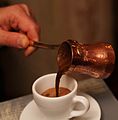Cezve
Today, Cezve is a topic of great interest and relevance in society. For decades, Cezve has been the subject of debate and research, generating conflicting opinions and causing significant changes in various areas. In this article, we will delve into the complexity of Cezve, exploring its different perspectives and consequences in our daily lives. We will look at how Cezve has evolved over time and how it continues to impact our society today. In addition, we will address the challenges that Cezve presents, as well as possible solutions and strategies to address them. Join us in this exciting exploration of Cezve and discover its countless facets!
This article needs attention from an expert in Arab world. See the talk page for details. (August 2023) |

A cezve (Turkish: cezve, pronounced [dʒezˈve]; Serbo-Croatian: džezva / џезва; Arabic: جِذوَة), also ibriki/briki (Greek: μπρίκι), srjep (Armenian: սրճեփ) is a small long-handled pot with a pouring lip designed specifically to make Turkish coffee. It is traditionally made of brass or copper, occasionally also silver or gold. In more recent times cezveler are also made from stainless steel, aluminium, or ceramics.
Name
The name cezve is of Turkish origin, where it is a borrowing from Arabic: جِذوَة (jadhwa or jidhwa, meaning 'ember').
The cezve is also known as an ibrik, a Turkish word from Arabic إبريق (ʿibrīq), from Aramaic ܐܖܪܝܩܐ (ʾaḇrēqā), from early Modern Persian *ābrēž (cf. Modern Persian ābrēz), from Middle Persian *āb-rēǰ, ultimately from Old Persian *āp- 'water' + *raiča- 'pour' (cf. Modern Persian and Middle Persian ریختن ).
Variations
In Bulgaria, Albania, Bosnia and Herzegovina, Croatia, Czechia, Montenegro, North Macedonia, Serbia, Slovakia and Slovenia, the cezve is a long-necked coffee pot. In Turkish an ibrik is not a coffee pot, but simply a pitcher or ewer.
Gallery
-
Copper cezve with Turkish coffee pouring out
-
Utensils to prepare Turkish coffee (handmade from Crete). A cezve is at the bottom.
-
Turkish coffee set containing a cup of coffee, a cezve and a sugar bowl
See also
- Dallah (Arabic coffee pot)
- Jebena (Ethiopian coffee pot)
- Arabic coffee
- Turkish coffee
- List of cooking vessels
References
- ^ Steingass, Francis Joseph (1992). A Comprehensive Persian-English Dictionary: Including the Arabic Words and Phrases to be Met with in Persian Literature, Being, Johnson and Richardson's Persian, Arabic, and English Dictionary, Revised, Enlarged, and Entirely Reconstructed. Asian Educational Services. ISBN 978-81-206-0670-8. page 8.
- ^ Arabic in Context: Celebrating 400 years of Arabic at Leiden University. BRILL. 6 June 2017. ISBN 9789004343047.
Sources
- alt.coffee thread archive regarding cezve word origin Archived 2011-05-14 at the Wayback Machine
- Comech's cezve page at tamu.edu Archived 2011-05-14 at the Wayback Machine


